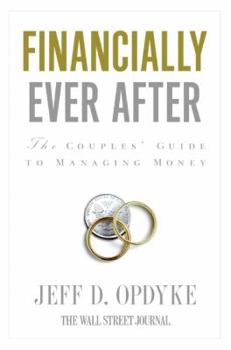Financially Ever After: The Couples' Guide to Managing Money
Select Format
Select Condition 
Book Overview
Your Guide to Managing the Real Dollars--and the Real Emotions--of Your Relationship Too often with money, couples face two choices: fight and risk making the situation worse, or keep quiet and risk making the situation worse. Financially Ever After offers a third option: family financial fluency--the insight, knowledge, and vocabulary every couple needs to communicate effectively about money. Jeff D. Opdyke, previously The Wall Street...
Format:Paperback
Language:English
ISBN:0061358185
ISBN13:9780061358180
Release Date:March 2009
Publisher:Harper Business
Length:240 Pages
Weight:1.80 lbs.
Dimensions:0.5" x 5.4" x 8.0"
Customer Reviews
2 ratings
A big fan, my only regret is that I did not get this many years ago when I was first married.
Published by Thriftbooks.com User , 14 years ago
I am a big fan of Jeff D. Opdyke . . . he has written about personal finance and the investment markets for THE WALL STREET JOURNAL since 1993, and for six years he wrote that paper's nationally syndicated "Love & Money" column. So when I came across his latest book, FINANCIALLY EVER AFTER (see also Section 2), I had to get hold of it in large part because of its subtitle: THE COUPLES' GUIDE TO MANAGING MONEY . . . my only regret is that I did not get this many years ago when I was first married. Back then, I alternated between the two options the author mentions: I sometimes fought and made the situation worse; other times, I just kept quiet and made the situation worse . . . what I did not know was that there was and is a third option; i.e., family financial fluency--the insight, knowledge and vocabulary every couple needs to effectively communicate about money. Opdyke covers just about all financial issues that two people in a relationship will face, including budgeting, deciding whether to have joint or individual accounts and confronting debt, as well as how best to handle a mortgage, allowances (for adults and children) and even engagement rings . . . he offers many real-life examples, several of them based on his own personal life. I particularly liked this heads-up he gave about entering into any relationship: * A bad sign to beware of is someone who complains regularly about the bills that arrive, who receives numerous monthly statements from creditors or who has to split a purchase across two or more credit cards because the credit available on one card isn't enough. Remember: When you take a partner into your life, you're also taking your partner's debt. While you aren't responsible for paying it, you will still be subject to its influence on the relationship, whether that influence manifests as a partner's stresses and frustrations about always being in debt. He also shared this useful rule to remember: * Family finance works best, and stress is reduced the most, when both partners know exactly what's going on with the money and where all the accounts are located. And, lastly, I appreciated the wisdom he shared on such basic everyday decisions as buying a house: * So how do you know if you're buying too much house? Here's a clue: If your lender cannot qualify you for the home of your dreams using a traditional, fixed-rate mortgage and, instead talks to you about considering adjustable-rate or interest-only mortgages, you're on the verge of living beyond your means.
warning to newlyweds!
Published by Thriftbooks.com User , 15 years ago
While I think the author gives a great deal of sound advice, I vehemently disagree with him that newly married couples should pool their money, giving up the idea of his and her bank accounts. While in theory this is a good idea, it is naive. Although most newly married couples may *think* they know their spouses and obviously *believe* that they can be trusted financially, i would advise any newly married couple to take a "wait and see" response. IF after a few years, you newly beloved spouse has demonstrated fiscal responsibility, then sure, merge. But for many, merging bank accounts can, yes, contribute to divorce AND further financial ruin when formerly trusted spouse cleans out the account by making purchases which were not discussed not agreed to. I know this sounds terribly negative, but I too thought i had a good sense of my husband's financial habits but boy oh boy was I wrong and It cost me terribly. I say the fiscal trust has to be earned, and DEMONSTRATED, and not only because you've said "I do."





